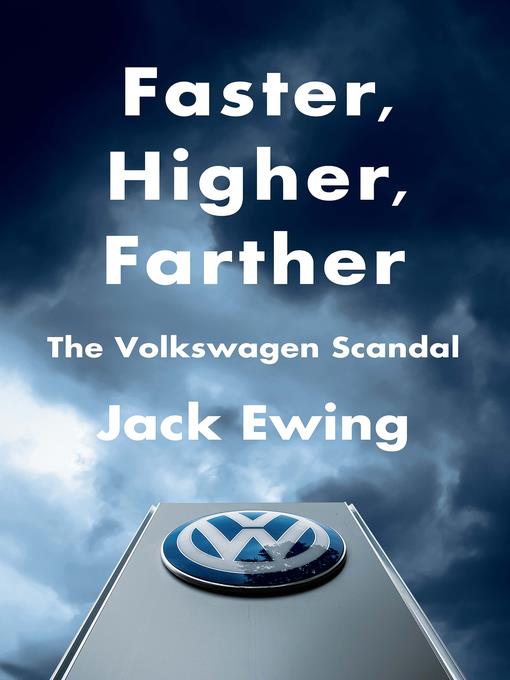
Faster, Higher, Farther
How One of the World's Largest Automakers Committed a Massive and Stunning Fraud
کتاب های مرتبط
- اطلاعات
- نقد و بررسی
- دیدگاه کاربران
نقد و بررسی

March 20, 2017
New York Times reporter Ewing has written a fascinating exposé of Volkswagen’s rise to becoming the world’s largest auto maker, a goal the company reached in 2015 just months before scandal broke over its emissions fraud. Ewing creates a compelling narrative out of corporate history, tracing Volkswagen’s growth from 1937 to the present to show the evolution of a strikingly top-down, hierarchical culture. Most interesting to many readers will be Volkswagen’s genesis as the “people’s car,” a Nazi propaganda tactic and particular pet project of Hitler’s that was intended to showcase Germany’s coming prosperity. Fast-forward to the 21st century, when new environmental concerns put a damper on this rapid growth. The challenge for regulators lay in both measuring dangerous emissions and working out how to apply those measurements to a wide variety of cars and the conditions under which they are driven. Ewing’s compelling prose makes his book read like entertainment more than education, and the story of Volkswagen’s fall—how the company cheated emissions-testing devices, was exposed by West Virginia University researchers, and, finally, was publicly cited by the EPA—is a study in corporate hubris. Interest in this now-faded scandal may be confined to a niche audience, but readers who pick up the book will be glad they did. Agent: Marly Rusoff, Marly Rusoff Literary Agency.

April 15, 2017
An expose of the scandal that threatened to bring one of the world's greatest automobile manufacturers to ruin.By installing "defeat devices" and software designed to underreport automobile emissions, Volkswagen executives violated international laws and protocols. What surprises most about that decision, writes New York Times European economic correspondent Ewing, is that there was no clear motivation for it: the people responsible were not enriched by it, and indeed they took "enormous risk for such a modest gain" given that the unit savings were so small. Something larger than mere gain must have motivated them. But what? In this thoroughgoing account of the affair, the author ventures a few guesses. Mostly, though, this is straight reportage, a narrative that begins with the discovery of a crime by graduate students who proved that an ordinary, street-level Jetta "was producing way more nitrogen oxides than a modern long-haul diesel truck." Ewing's discussion can get deeply technical at times, given that "pollution control systems," as he writes, "are complex rolling chemistry labs" and that sometimes all it takes is a stuck valve or a glitch in the car's computer to ruin the performance of those systems. Still, those control systems were selling points for diesel cars, with one early VW line boasting "a particularly elegant combination of fuel injection, turbocharging, and electronics that could be produced cheaply enough for midrange cars." What went wrong went badly wrong, and it was especially enraging to environmentally sensitive buyers who had bought Passats, Golfs, and other models precisely to do their part in saving the planet. Meanwhile, as the author reports in a narrative that soon turns to true crime, albeit of the white-collar variety, it was VW's foot soldiers who took the fall, at least at first, despite the $15 billion fine imposed for violations of the Clean Air Act and other laws. A shocking, sobering story--and, given the current anti-regulatory mood, one likely to be repeated.
COPYRIGHT(2017) Kirkus Reviews, ALL RIGHTS RESERVED.

April 15, 2017
From 2009 to 2015, Volkswagen sold 11 million cars with software installed to deceive governmental authorities regarding emissions emanating from the vehicles. In this book, which meticulously chronicles "one of the greatest corporate scandals ever," business journalist Ewing begins by offering a history of the company, focusing on the rise of Ferdinand Piech to chief executive officer and chairman of the supervisory board. Ewing argues that while there is no evidence linking Piech to the deception, it arose from a corporate culture that he had a good deal in creating and fostering. According to Ewing, the climate was insular, authoritarian, very aggressive, and not overly concerned with following legal norms; and, on top of all that, the company had weak internal controls. While manufacturing cars of quality under Piech's leadership, the company also engaged in criminal behavior beyond the deceptive software scandal. The book's prose is straightforward. Some of Ewing's sources are anonymous. VERDICT A readable account of a major scandal that will attract those interested in the auto industry and those concerned about the environment.--Shmuel Ben-Gad, Gelman Lib., George Washington Univ., Washington, DC
Copyright 2017 Library Journal, LLC Used with permission.

























دیدگاه کاربران